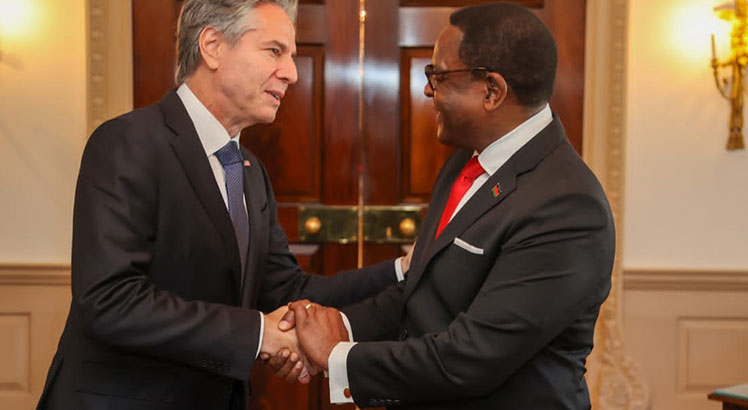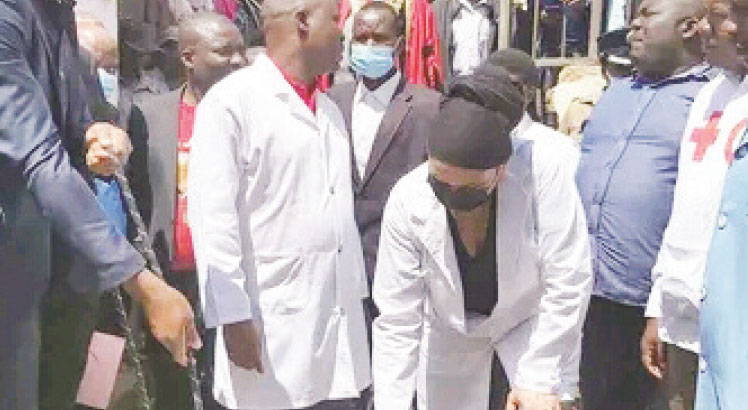Millennium Challenge Corporation (MCC) has formalised the award of its $350 million (about K362 billion) second compact to Malawi with a signing ceremony attended by President Lazarus Chakwera in Washington DC, United States of America.
In his speech during the ceremony monitored on Malawi Broadcasting Corporation Television last evening, US Secretary of State Anthony Blinken said his government is committed to contribute to Malawi’s development agenda through the new compact and other efforts.
He said Malawi will also continue to benefit from the Feed the Future programme, a flagship US government programme designed to alleviate hunger.
Blinken said: “The United States is dedicated to finance solutions to biggest challenges of our time with Malawi and its people. That is the guiding principle for our strategy for sub-Saharan Africa.”
He said through the partnerships, the goal should be to find how best to improve lives of the people now and in future. Blinken said the compact is a better placed programme to achieve the objectives. He said said he believed that the compact will be a game-changer to Malawians as it targets the key area of development, notably agriculture.
On the other hand, Chakwera, while thanking the US government for the second compact, reiterated the request he made in March last year in a conversation with MCC for consideration to have a compact which targets Malawi, Zambia and Mozambique as part of strengthening the regional integration agenda.
He said: “As an immediate past chair of Sadc [Southern African Development Community], I believe that enhancing regional integration with our neighbours through infrastructure such as rail and roads will have phenomenal economic benefits as safe and reliable rail and road transport will help reduce barriers to growth and create opportunities for all of our people.”
The new compact will focus on increasing land productivity through sector reforms, improving road infrastructure to reduce transport costs from farm to market and incentivising private investment into inclusive agriculture products.
The project’s brief shows that the compact will seek to promote agriculture commercialisation with a focus on rural communities, who will be linked to the commercial value chain.
Reads the report in part: “This is to be achieved through the facilitation of inclusive agribusinesses, provision of technical assistance, and establishment of a facility that will assist smallholder farmers particularly women to access finance.
“A further activity, christened Competitive Transport Activity, aims to construct secondary and link roads to facilitate farm to market access.”
Under the project, selected roads in rural areas will be improved to bitumen standard while some will be gravelled.
Five roads earmarked for upgrading under the compact include Mzimba-Euthini via Chakazi Bridge and Bulala, Euthini to Kacheche in Rumphi via Mzambazi, Mpherembe and Vwaza Marsh Wildlife Reserve as well as Likuni to Namitete via Malingunde and Phirilanjuzi in Lilongwe and Kasungu to Mkanda in Mchinji via Mwase. There is also the road from Chantulo in Mangochi to Khwisa in Balaka via Nankumba and Eastern Bwanje (Ntcheu).
In October 2021, MCC engaged a consultant to undertake a detailed feasibility study of the shortlisted eight corridors to assess and rank them according to the expected economic benefits.
Malawi qualified for the second compact towards the end of 2018 after successfully implementing the energy focused compact, which run for five years from 2013 to 2018.
Through the MCC energy compact, 12 megawatts (MW) was also added to the national grid following the rehabilitation of Nkula A Hydro Power Station to increase from 24MW to 36MW. It also covered administrative reforms in the power sector.
MCC is an innovative and independent US foreign assistance agency that is helping lead the fight against global poverty.
The post K362bn compact deal formalised appeared first on The Nation Online.
 Moni Malawi
Moni Malawi 

